高中情态动词
图片预览
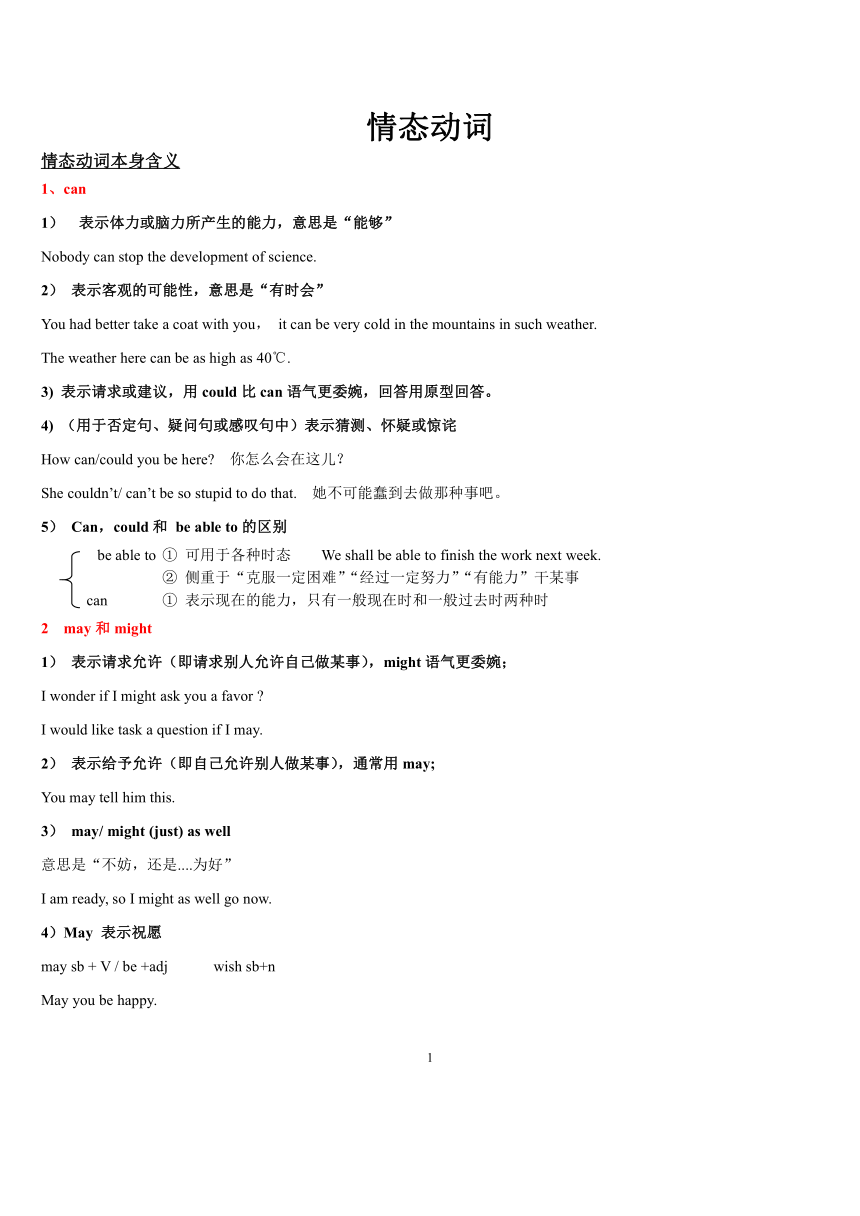
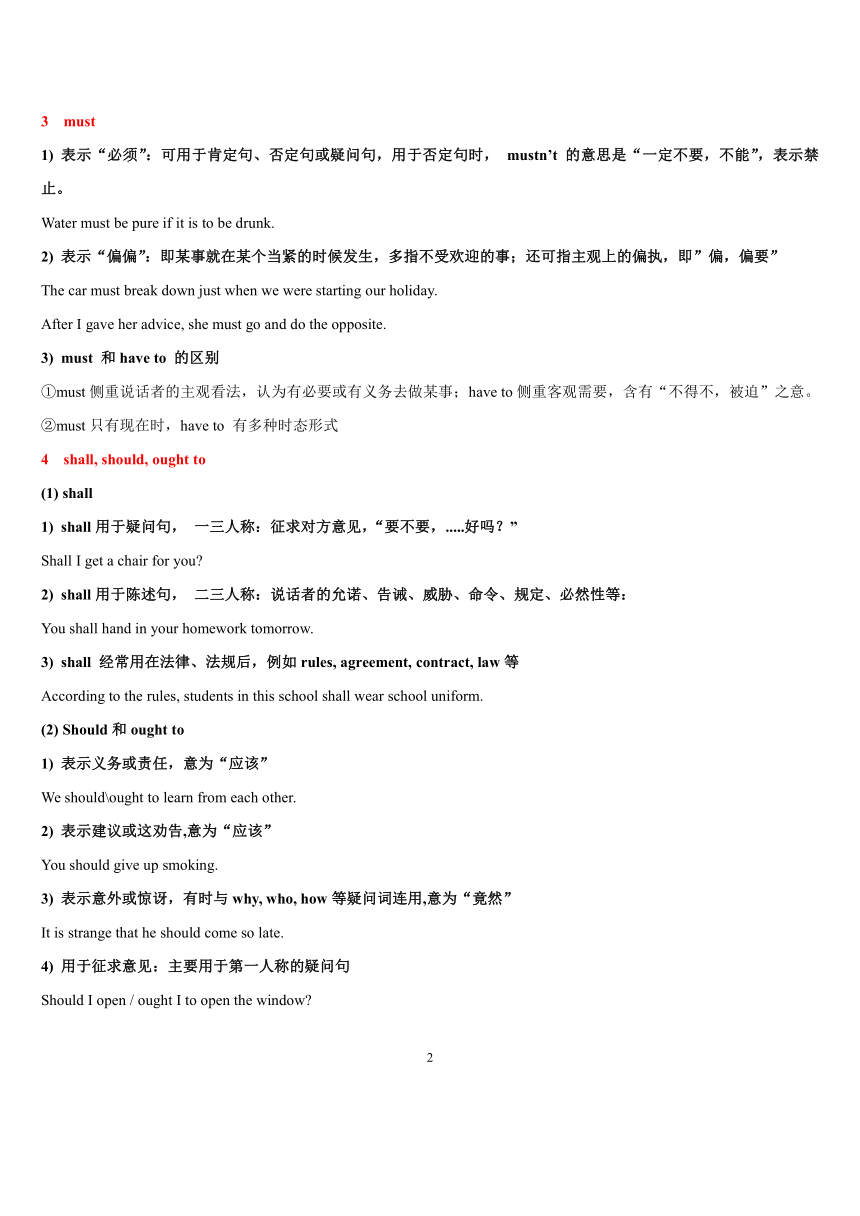
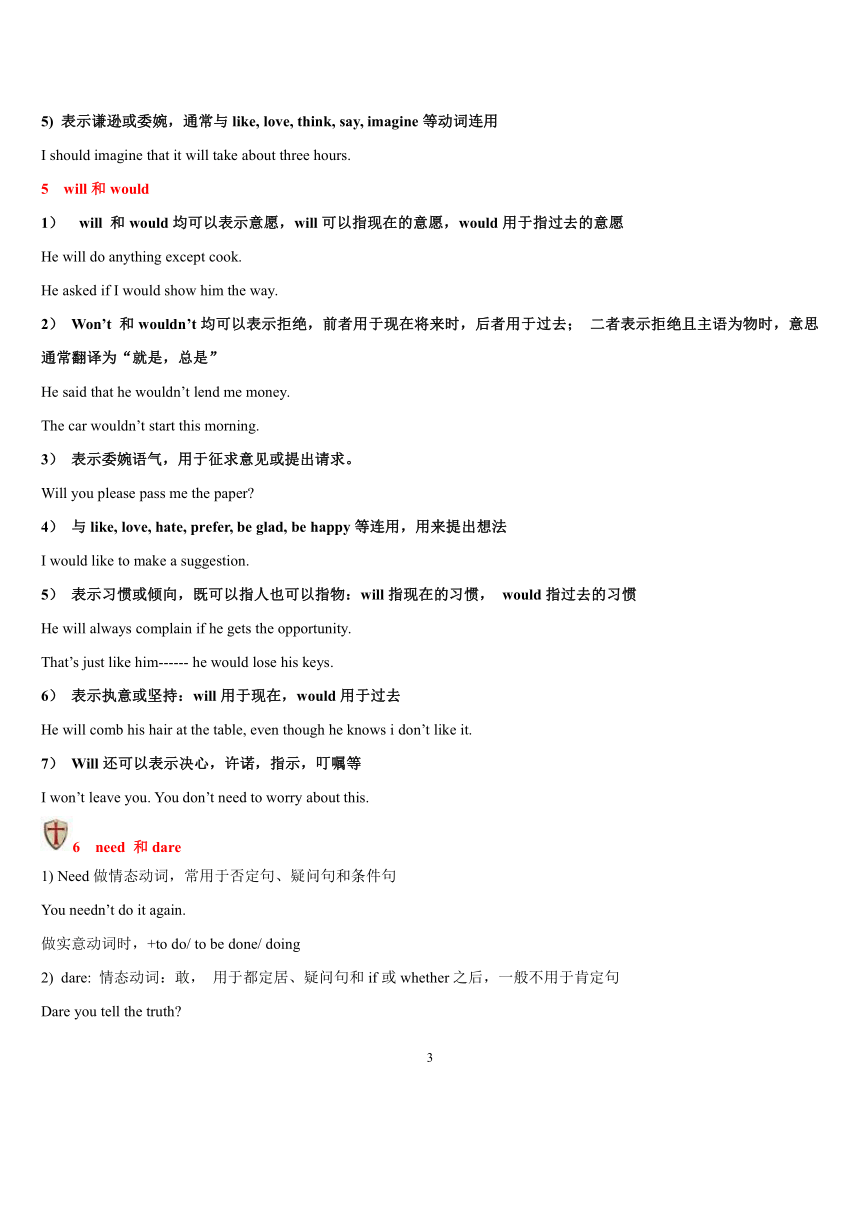
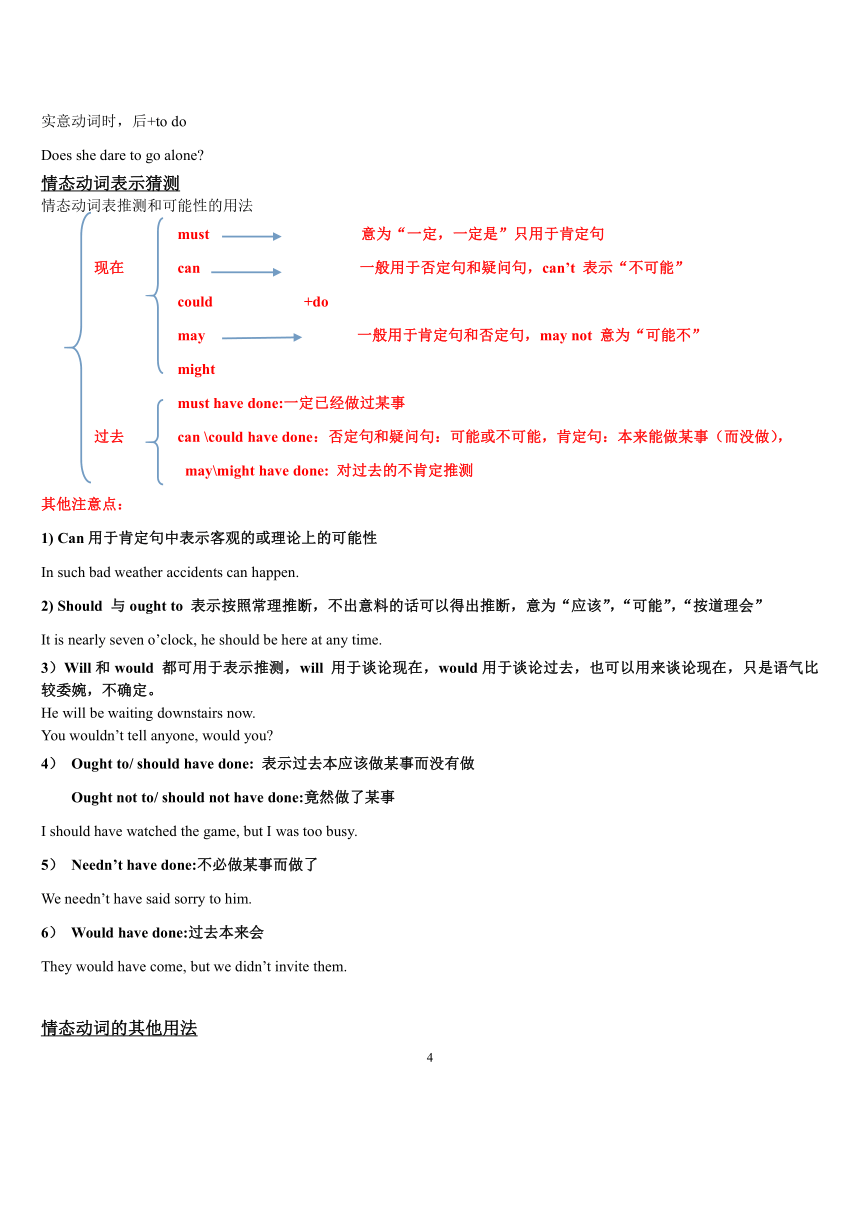
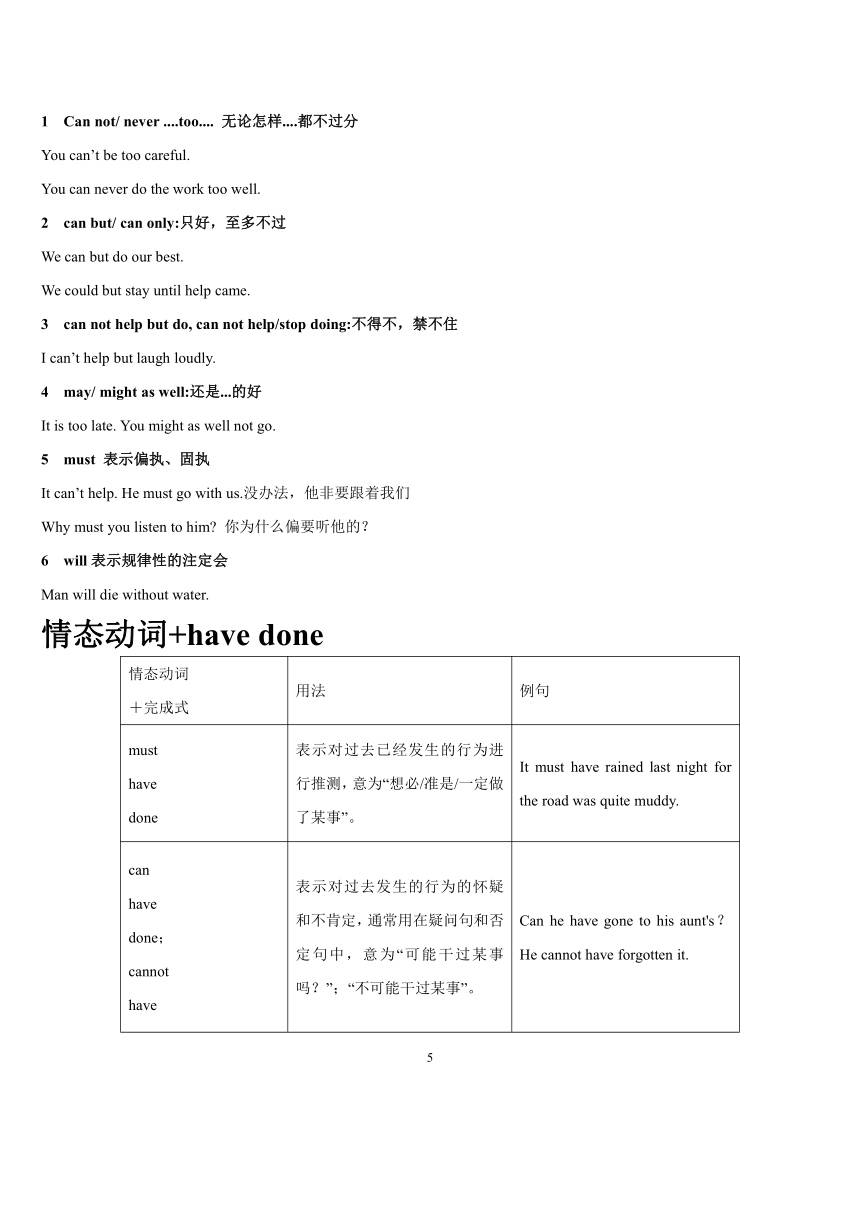
文档简介
情态动词
情态动词本身含义
1、can
表示体力或脑力所产生的能力,意思是“能够”
Nobody
can
stop
the
development
of
science.
表示客观的可能性,意思是“有时会”
You
had
better
take
a
coat
with
you,
it
can
be
very
cold
in
the
mountains
in
such
weather.
The
weather
here
can
be
as
high
as
40℃.
表示请求或建议,用could比can语气更委婉,回答用原型回答。
(用于否定句、疑问句或感叹句中)表示猜测、怀疑或惊诧
How
can/could
you
be
here
你怎么会在这儿?
She
couldn’t/
can’t
be
so
stupid
to
do
that.
她不可能蠢到去做那种事吧。
Can,could和
be
able
to的区别
be
able
to
①
可用于各种时态
We
shall
be
able
to
finish
the
work
next
week.
②
侧重于“克服一定困难”“经过一定努力”“有能力”干某事
can
①
表示现在的能力,只有一般现在时和一般过去时两种时
2
may和might
表示请求允许(即请求别人允许自己做某事),might语气更委婉;
I
wonder
if
I
might
ask
you
a
favor
I
would
like
task
a
question
if
I
may.
表示给予允许(即自己允许别人做某事),通常用may;
You
may
tell
him
this.
3)
may/
might
(just)
as
well
意思是“不妨,还是....为好”
I
am
ready,
so
I
might
as
well
go
now.
4)May
表示祝愿
may
sb
+
V
/
be
+adj
wish
sb+n
May
you
be
happy.
3
must
表示“必须”:可用于肯定句、否定句或疑问句,用于否定句时,
mustn’t
的意思是“一定不要,不能”,表示禁止。
Water
must
be
pure
if
it
is
to
be
drunk.
表示“偏偏”:即某事就在某个当紧的时候发生,多指不受欢迎的事;还可指主观上的偏执,即”偏,偏要”
The
car
must
break
down
just
when
we
were
starting
our
holiday.
After
I
gave
her
advice,
she
must
go
and
do
the
opposite.
must
和have
to
的区别
①must侧重说话者的主观看法,认为有必要或有义务去做某事;have
to侧重客观需要,含有“不得不,被迫”之意。
②must只有现在时,have
to
有多种时态形式
4
shall,
should,
ought
to
(1)
shall
shall用于疑问句,
一三人称:征求对方意见,“要不要,.....好吗?”
Shall
I
get
a
chair
for
you
shall用于陈述句,
二三人称:说话者的允诺、告诫、威胁、命令、规定、必然性等:
You
shall
hand
in
your
homework
tomorrow.
shall
经常用在法律、法规后,例如rules,
agreement,
contract,
law等
According
to
the
rules,
students
in
this
school
shall
wear
school
uniform.
(2)
Should和ought
to
表示义务或责任,意为“应该”
We
should\ought
to
learn
from
each
other.
表示建议或这劝告,意为“应该”
You
should
give
up
smoking.
表示意外或惊讶,有时与why,
who,
how等疑问词连用,意为“竟然”
It
is
strange
that
he
should
come
so
late.
用于征求意见:主要用于第一人称的疑问句
Should
I
open
/
ought
I
to
open
the
window
表示谦逊或委婉,通常与like,
love,
think,
say,
imagine等动词连用
I
should
imagine
that
it
will
take
about
three
hours.
5
will和would
will
和would均可以表示意愿,will可以指现在的意愿,would用于指过去的意愿
He
will
do
anything
except
cook.
He
asked
if
I
would
show
him
the
way.
Won’t
和wouldn’t均可以表示拒绝,前者用于现在将来时,后者用于过去;
二者表示拒绝且主语为物时,意思通常翻译为“就是,总是”
He
said
that
he
wouldn’t
lend
me
money.
The
car
wouldn’t
start
this
morning.
表示委婉语气,用于征求意见或提出请求。
Will
you
please
pass
me
the
paper
与like,
love,
hate,
prefer,
be
glad,
be
happy等连用,用来提出想法
I
would
like
to
make
a
suggestion.
表示习惯或倾向,既可以指人也可以指物:will指现在的习惯,
would指过去的习惯
He
will
always
complain
if
he
gets
the
opportunity.
That’s
just
like
him------
he
would
lose
his
keys.
表示执意或坚持:will用于现在,would用于过去
He
will
comb
his
hair
at
the
table,
even
though
he
knows
i
don’t
like
it.
Will还可以表示决心,许诺,指示,叮嘱等
I
won’t
leave
you.
You
don’t
need
to
worry
about
this.
6
need
和dare
1)
Need做情态动词,常用于否定句、疑问句和条件句
You
needn’t
do
it
again.
做实意动词时,+to
do/
to
be
done/
doing
dare:
情态动词:敢,
用于都定居、疑问句和if或whether之后,一般不用于肯定句
Dare
you
tell
the
truth
实意动词时,后+to
do
Does
she
dare
to
go
alone
情态动词表示猜测
情态动词表推测和可能性的用法
must
意为“一定,一定是”只用于肯定句
现在
can
一般用于否定句和疑问句,can’t
表示“不可能”
could
+do
may
一般用于肯定句和否定句,may
not
意为“可能不”
might
must
have
done:一定已经做过某事
过去
can
\could
have
done:否定句和疑问句:可能或不可能,肯定句:本来能做某事(而没做),
may\might
have
done:
对过去的不肯定推测
其他注意点:
1)
Can用于肯定句中表示客观的或理论上的可能性
In
such
bad
weather
accidents
can
happen.
2)
Should
与ought
to
表示按照常理推断,不出意料的话可以得出推断,意为“应该”,“可能”,“按道理会”
It
is
nearly
seven
o’clock,
he
should
be
here
at
any
time.
3)Will和would
都可用于表示推测,will
用于谈论现在,would用于谈论过去,也可以用来谈论现在,只是语气比较委婉,不确定。
He
will
be
waiting
downstairs
now.
You
wouldn’t
tell
anyone,
would
you
4)
Ought
to/
should
have
done:
表示过去本应该做某事而没有做
Ought
not
to/
should
not
have
done:竟然做了某事
I
should
have
watched
the
game,
but
I
was
too
busy.
5)
Needn’t
have
done:不必做某事而做了
We
needn’t
have
said
sorry
to
him.
6)
Would
have
done:过去本来会
They
would
have
come,
but
we
didn’t
invite
them.
情态动词的其他用法
1
Can
not/
never
....too....
无论怎样....都不过分
You
can’t
be
too
careful.
You
can
never
do
the
work
too
well.
2
can
but/
can
only:只好,至多不过
We
can
but
do
our
best.
We
could
but
stay
until
help
came.
3
can
not
help
but
do,
can
not
help/stop
doing:不得不,禁不住
I
can’t
help
but
laugh
loudly.
4
may/
might
as
well:还是...的好
It
is
too
late.
You
might
as
well
not
go.
5
must
表示偏执、固执
It
can’t
help.
He
must
go
with
us.没办法,他非要跟着我们
Why
must
you
listen
to
him
你为什么偏要听他的?
6
will表示规律性的注定会
Man
will
die
without
water.
情态动词+have
done
情态动词+完成式
用法
例句
musthavedone
表示对过去已经发生的行为进行推测,意为“想必/准是/一定做了某事”。
It
must
have
rained
last
night
for
the
road
was
quite
muddy.
canhavedone;cannothavedone
表示对过去发生的行为的怀疑和不肯定,通常用在疑问句和否定句中,意为“可能干过某事吗?”;“不可能干过某事”。
Can
he
have
gone
to
his
aunt's?He
cannot
have
forgotten
it.
couldhavedone
“已经……”之意,此外,还可以表示过去没有实现的可能性,意为“本来可以……”。
I
saw
Mr.Wang
just
now.He
couldn't
have
gone
to
Beijing.
may/mighthavedone
表示对过去已发生行为的推测,意为“也许/或许已经(没有)……”。一般只用于肯定句或否定句中(在否定句中表示“可能不”),不用于疑问句。用might则表示语气更加不肯定。
It's
too
late.I
think
he
may
have
gone
to
bed.
He
may
not
have
finished
the
work.She
might
have
caught
a
cold.
mighthavedone
表示“本来可能……”,但实际上没有发生的事。另外,还可以表示“本来应该或可以做某事”之意,含有轻微的责备语气。
You
should
not
have
swum
in
that
sea.You
might
have
been
eaten
by
fish.
You
might
have
given
him
more
help,
though
you
were
busy.
should/oughtto
havedone
用于肯定句时,表示本该做某事,而实际上未做,意为“本应该”;用于否定句时,则表示不该做的事反而做了,意为“本不应该”。
You
should
have
come
to
the
meeting
earlier.
You
ought
to
have
done
this
exercise
more
carefully.
You
shouldn't
have
told
her
the
truth.
He
ought
not
to
have
treated
his
parents
like
that.
needn'thavedone
表示做了本来不必去做的事,意为“本没必要做某事”;而didn't
need
to
do则表示过去没必要做而实际上也没有做某事。
You
needn't
have
taken
a
taxi
here,for
it
was
very
near
to
my
house.
I
didn't
need
to
clean
the
windows.My
brother
did
it.
hadbetterhavedone
用于事后的建议,含轻微责备的口吻,意为“当时最好做了某事”,其否定式had
better
not
have
done表达相反的含义。
You
had
better
have
started
earlier.
You
had
better
not
have
scolded
her.
wouldratherhavedone
表示“宁愿做过某事”,其否定式would
rather
not
have
done表达相反的含义,两者都表示“后悔”之意。
I
would
rather
have
taken
his
advice.
I
raised
objections
at
the
meeting,but
now
I
would
rather
not
have
done
that.
wouldlike/love
tohavedone
表示过去愿意做某事,但未做成,意为“愿意做过某事”。
I
would
love
to
have
gone
to
the
party
last
night
but
I
had
to
work
extra
hours
to
finish
a
report.
例题精讲
【2014】
1.(2014大纲全国卷,30,1分)Although
you______find
bargains
in
London,it’s
not
generally
a
cheap
place
to
shop.
A.should
B.need
C.must
D.can
2.(2014重庆,3,1分)I’ve
ordered
some
pizza,so
we______worry
about
cooking
when
we
get
home
tired.
A.can’t
B.dare
not
C.needn’t
D.may
not
3.(2014四川,6)I
still
remember
my
happy
childhood
when
my
mother______take
me
to
Disneyland
at
weekends.
A.might
B.must
C.would
D.should
4.(2014江西,30,1分)Life
is
unpredictable;even
the
poorest______become
the
richest.
A.shall
B.must
C.need
D.might
5.(2014湖南,25,1分)—I’ve
prepared
all
kinds
of
food
for
the
picnic.
—Do
you
mean
we______bring
anything
with
us
A.can’t
B.mustn’t
C.shan’t
D.needn’t
6.(2014陕西,25,1分)My
book,The
House
of
Hades,is
missing.Who______have
taken
it
A.need
B.must
C.should
D.could
7.(2014江苏,31,1分)It
was
sad
to
me
that
they,so
poor
themselves,______bring
me
food.
A.might
B.would
C.should
D.could
8.(2014北京,27)______I
have
a
word
with
you It
won’t
take
long.
A.Can
B.Must
C.Shall
D.Should
[答案]
1.D
[答案]
2.C
[答案]
3.C
[答案]
4.D
[答案]
5.D
[答案]
6.D
[答案]
7.C
[答案]
8.A
巩固加强
1.(2013大纲,26,1分)Since
nobody
gave
him
any
help,
he have
done
the
research
on
his
own.
A.
can B.
must C.
would D.
need
2.(2013重庆,26,1分)—What
are
you
doing
this
Saturday
—I’m
not
sure,
but
I go
to
the
Rolling
Stones
concert.
A.
must B.
would C.
should D.
might
3.(2013四川,5,1分)—Why
are
your
eyes
so
red
You have
slept
well
last
night.
—Yeah,
I
stayed
up
late
writing
a
report.
A.
can’t B.
mustn’t C.
needn’t D.
won’t
4.(2013江西,29,1分)When
I
was
a
child,
I watch
TV
whenever
I
wanted
to.
A.
should B.
could C.
must D.
need
5.(2013湖南,32,1分)He sleep,
although
he
tried
to,
when
he
got
on
such
a
hunt
for
an
idea
until
he
had
caught
it.
A.
wouldn’t B.
shouldn’t C.
couldn’t D.
mustn’t
6.(2013陕西,21,1分)The
children lost
in
the
woods;
otherwise,
they
would
have
been
at
the
lakeside
camp
as
scheduled.
A.
must
have
got B.
must
get C.
should
have
got D.
should
get
7.(2013陕西,12,1分)My
mom
suggests
that
we eat
out
for
a
change
this
weekend.
A.
should B.
might C.
could D.
would
8.(2013安徽,34,1分)It be
the
vocabulary
that
caused
you
the
problem
in
the
exercise
because
you
know
a
lot
of
words.
A.
may B.
couldn’t C.
should D.
needn’t
9.(2013天津,9,1分)No
one be
more
generous;
he
has
a
heart
of
gold.
A.
could B.
must C.
dare D.
need
10.(2013北京,35,1分)—You
needn’t
take
an
umbrella.
It
isn’t
going
to
rain.
—Well,
I
don’t
know.
It do.
A.
might B.
need C.
would D.
should
11.(2013课标II,
6,1分)Since
nobody
gave
him
any
help,
he have
done
the
research
on
his
own.
A.
can B.
must C.
would D.
need
12.(2013课标I,29,1分)The
door open,
no
matter
how
hard
she
pushed.
A.
shouldn’t B.
couldn’t C.
wouldn’t D.
mightn’t
[答案]
1.B
[答案]
2.D
[答案]
3.A
[答案]
4.B
[答案]
5.C
[答案]
6.A
[答案]
7.A
[答案]
8.B
[答案]
9.A
[答案]
10.A
[答案]
11.B
[答案]
12.C
课后作业
【2012年】
1.(2012课标·全国Ⅰ,
30)
I_____use
a
clock
to
wake
me
up
because
at
six
o’clock
each
morning
the
train
comes
by
my
house.
A.
couldn’t
B.
mustn’t
C.
shouldn’t
D.
needn’t
2.(2012全国Ⅱ,
17)
I’m
going
to
Europe
on
vacation
together
with
John
if
I
_____find
the
money.
A.
can B.
might
C.
would
D.
need
3.(2012天津,
8)
It’s
quite
warm
here;
we____
turn
the
heating
on
yet.
A.
couldn’t
B.
mustn’t
C.
needn’t
D.
wouldn’t
4.(2012江西,
22)
We____have
bought
so
much
food
now
that
Suzie
won’t
be
with
us
for
dinner.
A.
may
not B.
needn’t C.
can’t D.
mustn’t
5.(2012陕西,
23)
I_____
thank
you
too
much
for
all
your
help
to
my
son
while
we
were
away
from
home.
A.
won’t B.
can’t C.
can D.
will
6.(2012江苏,
28)
Days
later,
my
brother
called
to
say
he
was
all
right,
but______say
where
he
was.
A.
mustn’t
B.
shouldn’t C.
wouldn’t D.
mightn’t
7.(2012辽宁,
24)
One
of
our
rules
is
that
every
student_____
wear
school
uniform
while
at
school.
A.
might B.
could C.
shall D.
will
8.(2012四川,
19)
I
got
close
enough
to
hear
them
speaking
Chinese,
and
I
said
“Ni
Hao”,
just
as
I_____do
in
China.
A.
must B.
might
C.
can D.
should
9.
(2012重庆,
25)
—
____you
interrupt
now
Can’t
you
see
I’m
on
the
phone
—Sorry
Sir,
but
it’s
urgent.
Can B.
Should
C.
Must
D.
Would
[答案]
1.D
[答案]
2.A
[答案]
3.C
[答案]
4.B
[答案]
5.B
[答案]
6.C
[答案]
7.C
[答案]
8.B
[答案]
9.C
【2015年】
1.(2015福建,27)—Sorry,
Mum!
I
failed
the
job
interview
again.
—Oh,
It’s
too
bad.
You______
have
made
full
preparations.
A.must
B.can
C.would
D.should
2.(2015四川,2)You______be
careful
with
the
camera.It
costs!
A.must
B.may
C.can
D.will
3.(2015陕西,21)You_____feel
all
the
training
a
waste
of
time,but
I’m
a
hundred
percent
sure
later
you’ll
be
grateful
you
did
it.
A.should
B.need
C.shall
D.may
4.(2015浙江,4)It
was
so
noisy
that
we______hear
ourselves
speak.
A.couldn’t
B.shouldn’t
C.mustn’t
D.needn’t
5.(2015重庆,12)You
______be
Carol.
You
haven’t
changed
a
bit
after
all
these
years.
A.must
B.can
C.will
D.shall
6.(2015北京,29)—Can’t
you
stay
a
little
longer
—It’s
getting
late.I
really______go
now.My
daughter
is
home
alone.
A.may
B.can
C.must
D.dare
7.(2015天津,7)I______
have
worried
before
I
came
to
the
new
school,for
my
classmates
here
are
very
friendly
to
me.
A.mightn’t B.mustn’t C.needn’t D.couldn’t
[答案]
1.D
[答案]
2.A
[答案]
3.D
[答案]
4.A
[答案]
5.A
[答案]
6.C
[答案]
7.C
(2017天津卷)2.
My
room
is
a
mess,
but
I
__________clean
it
before
I
go
out
tonight.
I
can
do
it
in
the
morning.
A.
daren’t
B.
shouldn’t
C.
needn’t
D.
mustn’t
【答案】C
【解析】
试题分析:句意:我的房间很乱,但是在今晚我出去之前不需要打扫,我可以明天早晨再打扫。A.
不敢;B.
不应该;C.
不需要;D.
禁止。根据句意,故选C。
(2017北京卷)21.
Samuel,
the
tallest
boy
in
our
class,
______
easily
reach
the
books
on
the
top
shelf.
A.
must
B.
should
C.
can
D.
need
【答案】C
【解析】考查情态动词。句意:Samuel,我们班最高的男生,能很轻松地够着书架顶上的书。表示能力,用can。
PAGE
1
情态动词本身含义
1、can
表示体力或脑力所产生的能力,意思是“能够”
Nobody
can
stop
the
development
of
science.
表示客观的可能性,意思是“有时会”
You
had
better
take
a
coat
with
you,
it
can
be
very
cold
in
the
mountains
in
such
weather.
The
weather
here
can
be
as
high
as
40℃.
表示请求或建议,用could比can语气更委婉,回答用原型回答。
(用于否定句、疑问句或感叹句中)表示猜测、怀疑或惊诧
How
can/could
you
be
here
你怎么会在这儿?
She
couldn’t/
can’t
be
so
stupid
to
do
that.
她不可能蠢到去做那种事吧。
Can,could和
be
able
to的区别
be
able
to
①
可用于各种时态
We
shall
be
able
to
finish
the
work
next
week.
②
侧重于“克服一定困难”“经过一定努力”“有能力”干某事
can
①
表示现在的能力,只有一般现在时和一般过去时两种时
2
may和might
表示请求允许(即请求别人允许自己做某事),might语气更委婉;
I
wonder
if
I
might
ask
you
a
favor
I
would
like
task
a
question
if
I
may.
表示给予允许(即自己允许别人做某事),通常用may;
You
may
tell
him
this.
3)
may/
might
(just)
as
well
意思是“不妨,还是....为好”
I
am
ready,
so
I
might
as
well
go
now.
4)May
表示祝愿
may
sb
+
V
/
be
+adj
wish
sb+n
May
you
be
happy.
3
must
表示“必须”:可用于肯定句、否定句或疑问句,用于否定句时,
mustn’t
的意思是“一定不要,不能”,表示禁止。
Water
must
be
pure
if
it
is
to
be
drunk.
表示“偏偏”:即某事就在某个当紧的时候发生,多指不受欢迎的事;还可指主观上的偏执,即”偏,偏要”
The
car
must
break
down
just
when
we
were
starting
our
holiday.
After
I
gave
her
advice,
she
must
go
and
do
the
opposite.
must
和have
to
的区别
①must侧重说话者的主观看法,认为有必要或有义务去做某事;have
to侧重客观需要,含有“不得不,被迫”之意。
②must只有现在时,have
to
有多种时态形式
4
shall,
should,
ought
to
(1)
shall
shall用于疑问句,
一三人称:征求对方意见,“要不要,.....好吗?”
Shall
I
get
a
chair
for
you
shall用于陈述句,
二三人称:说话者的允诺、告诫、威胁、命令、规定、必然性等:
You
shall
hand
in
your
homework
tomorrow.
shall
经常用在法律、法规后,例如rules,
agreement,
contract,
law等
According
to
the
rules,
students
in
this
school
shall
wear
school
uniform.
(2)
Should和ought
to
表示义务或责任,意为“应该”
We
should\ought
to
learn
from
each
other.
表示建议或这劝告,意为“应该”
You
should
give
up
smoking.
表示意外或惊讶,有时与why,
who,
how等疑问词连用,意为“竟然”
It
is
strange
that
he
should
come
so
late.
用于征求意见:主要用于第一人称的疑问句
Should
I
open
/
ought
I
to
open
the
window
表示谦逊或委婉,通常与like,
love,
think,
say,
imagine等动词连用
I
should
imagine
that
it
will
take
about
three
hours.
5
will和would
will
和would均可以表示意愿,will可以指现在的意愿,would用于指过去的意愿
He
will
do
anything
except
cook.
He
asked
if
I
would
show
him
the
way.
Won’t
和wouldn’t均可以表示拒绝,前者用于现在将来时,后者用于过去;
二者表示拒绝且主语为物时,意思通常翻译为“就是,总是”
He
said
that
he
wouldn’t
lend
me
money.
The
car
wouldn’t
start
this
morning.
表示委婉语气,用于征求意见或提出请求。
Will
you
please
pass
me
the
paper
与like,
love,
hate,
prefer,
be
glad,
be
happy等连用,用来提出想法
I
would
like
to
make
a
suggestion.
表示习惯或倾向,既可以指人也可以指物:will指现在的习惯,
would指过去的习惯
He
will
always
complain
if
he
gets
the
opportunity.
That’s
just
like
him------
he
would
lose
his
keys.
表示执意或坚持:will用于现在,would用于过去
He
will
comb
his
hair
at
the
table,
even
though
he
knows
i
don’t
like
it.
Will还可以表示决心,许诺,指示,叮嘱等
I
won’t
leave
you.
You
don’t
need
to
worry
about
this.
6
need
和dare
1)
Need做情态动词,常用于否定句、疑问句和条件句
You
needn’t
do
it
again.
做实意动词时,+to
do/
to
be
done/
doing
dare:
情态动词:敢,
用于都定居、疑问句和if或whether之后,一般不用于肯定句
Dare
you
tell
the
truth
实意动词时,后+to
do
Does
she
dare
to
go
alone
情态动词表示猜测
情态动词表推测和可能性的用法
must
意为“一定,一定是”只用于肯定句
现在
can
一般用于否定句和疑问句,can’t
表示“不可能”
could
+do
may
一般用于肯定句和否定句,may
not
意为“可能不”
might
must
have
done:一定已经做过某事
过去
can
\could
have
done:否定句和疑问句:可能或不可能,肯定句:本来能做某事(而没做),
may\might
have
done:
对过去的不肯定推测
其他注意点:
1)
Can用于肯定句中表示客观的或理论上的可能性
In
such
bad
weather
accidents
can
happen.
2)
Should
与ought
to
表示按照常理推断,不出意料的话可以得出推断,意为“应该”,“可能”,“按道理会”
It
is
nearly
seven
o’clock,
he
should
be
here
at
any
time.
3)Will和would
都可用于表示推测,will
用于谈论现在,would用于谈论过去,也可以用来谈论现在,只是语气比较委婉,不确定。
He
will
be
waiting
downstairs
now.
You
wouldn’t
tell
anyone,
would
you
4)
Ought
to/
should
have
done:
表示过去本应该做某事而没有做
Ought
not
to/
should
not
have
done:竟然做了某事
I
should
have
watched
the
game,
but
I
was
too
busy.
5)
Needn’t
have
done:不必做某事而做了
We
needn’t
have
said
sorry
to
him.
6)
Would
have
done:过去本来会
They
would
have
come,
but
we
didn’t
invite
them.
情态动词的其他用法
1
Can
not/
never
....too....
无论怎样....都不过分
You
can’t
be
too
careful.
You
can
never
do
the
work
too
well.
2
can
but/
can
only:只好,至多不过
We
can
but
do
our
best.
We
could
but
stay
until
help
came.
3
can
not
help
but
do,
can
not
help/stop
doing:不得不,禁不住
I
can’t
help
but
laugh
loudly.
4
may/
might
as
well:还是...的好
It
is
too
late.
You
might
as
well
not
go.
5
must
表示偏执、固执
It
can’t
help.
He
must
go
with
us.没办法,他非要跟着我们
Why
must
you
listen
to
him
你为什么偏要听他的?
6
will表示规律性的注定会
Man
will
die
without
water.
情态动词+have
done
情态动词+完成式
用法
例句
musthavedone
表示对过去已经发生的行为进行推测,意为“想必/准是/一定做了某事”。
It
must
have
rained
last
night
for
the
road
was
quite
muddy.
canhavedone;cannothavedone
表示对过去发生的行为的怀疑和不肯定,通常用在疑问句和否定句中,意为“可能干过某事吗?”;“不可能干过某事”。
Can
he
have
gone
to
his
aunt's?He
cannot
have
forgotten
it.
couldhavedone
“已经……”之意,此外,还可以表示过去没有实现的可能性,意为“本来可以……”。
I
saw
Mr.Wang
just
now.He
couldn't
have
gone
to
Beijing.
may/mighthavedone
表示对过去已发生行为的推测,意为“也许/或许已经(没有)……”。一般只用于肯定句或否定句中(在否定句中表示“可能不”),不用于疑问句。用might则表示语气更加不肯定。
It's
too
late.I
think
he
may
have
gone
to
bed.
He
may
not
have
finished
the
work.She
might
have
caught
a
cold.
mighthavedone
表示“本来可能……”,但实际上没有发生的事。另外,还可以表示“本来应该或可以做某事”之意,含有轻微的责备语气。
You
should
not
have
swum
in
that
sea.You
might
have
been
eaten
by
fish.
You
might
have
given
him
more
help,
though
you
were
busy.
should/oughtto
havedone
用于肯定句时,表示本该做某事,而实际上未做,意为“本应该”;用于否定句时,则表示不该做的事反而做了,意为“本不应该”。
You
should
have
come
to
the
meeting
earlier.
You
ought
to
have
done
this
exercise
more
carefully.
You
shouldn't
have
told
her
the
truth.
He
ought
not
to
have
treated
his
parents
like
that.
needn'thavedone
表示做了本来不必去做的事,意为“本没必要做某事”;而didn't
need
to
do则表示过去没必要做而实际上也没有做某事。
You
needn't
have
taken
a
taxi
here,for
it
was
very
near
to
my
house.
I
didn't
need
to
clean
the
windows.My
brother
did
it.
hadbetterhavedone
用于事后的建议,含轻微责备的口吻,意为“当时最好做了某事”,其否定式had
better
not
have
done表达相反的含义。
You
had
better
have
started
earlier.
You
had
better
not
have
scolded
her.
wouldratherhavedone
表示“宁愿做过某事”,其否定式would
rather
not
have
done表达相反的含义,两者都表示“后悔”之意。
I
would
rather
have
taken
his
advice.
I
raised
objections
at
the
meeting,but
now
I
would
rather
not
have
done
that.
wouldlike/love
tohavedone
表示过去愿意做某事,但未做成,意为“愿意做过某事”。
I
would
love
to
have
gone
to
the
party
last
night
but
I
had
to
work
extra
hours
to
finish
a
report.
例题精讲
【2014】
1.(2014大纲全国卷,30,1分)Although
you______find
bargains
in
London,it’s
not
generally
a
cheap
place
to
shop.
A.should
B.need
C.must
D.can
2.(2014重庆,3,1分)I’ve
ordered
some
pizza,so
we______worry
about
cooking
when
we
get
home
tired.
A.can’t
B.dare
not
C.needn’t
D.may
not
3.(2014四川,6)I
still
remember
my
happy
childhood
when
my
mother______take
me
to
Disneyland
at
weekends.
A.might
B.must
C.would
D.should
4.(2014江西,30,1分)Life
is
unpredictable;even
the
poorest______become
the
richest.
A.shall
B.must
C.need
D.might
5.(2014湖南,25,1分)—I’ve
prepared
all
kinds
of
food
for
the
picnic.
—Do
you
mean
we______bring
anything
with
us
A.can’t
B.mustn’t
C.shan’t
D.needn’t
6.(2014陕西,25,1分)My
book,The
House
of
Hades,is
missing.Who______have
taken
it
A.need
B.must
C.should
D.could
7.(2014江苏,31,1分)It
was
sad
to
me
that
they,so
poor
themselves,______bring
me
food.
A.might
B.would
C.should
D.could
8.(2014北京,27)______I
have
a
word
with
you It
won’t
take
long.
A.Can
B.Must
C.Shall
D.Should
[答案]
1.D
[答案]
2.C
[答案]
3.C
[答案]
4.D
[答案]
5.D
[答案]
6.D
[答案]
7.C
[答案]
8.A
巩固加强
1.(2013大纲,26,1分)Since
nobody
gave
him
any
help,
he have
done
the
research
on
his
own.
A.
can B.
must C.
would D.
need
2.(2013重庆,26,1分)—What
are
you
doing
this
Saturday
—I’m
not
sure,
but
I go
to
the
Rolling
Stones
concert.
A.
must B.
would C.
should D.
might
3.(2013四川,5,1分)—Why
are
your
eyes
so
red
You have
slept
well
last
night.
—Yeah,
I
stayed
up
late
writing
a
report.
A.
can’t B.
mustn’t C.
needn’t D.
won’t
4.(2013江西,29,1分)When
I
was
a
child,
I watch
TV
whenever
I
wanted
to.
A.
should B.
could C.
must D.
need
5.(2013湖南,32,1分)He sleep,
although
he
tried
to,
when
he
got
on
such
a
hunt
for
an
idea
until
he
had
caught
it.
A.
wouldn’t B.
shouldn’t C.
couldn’t D.
mustn’t
6.(2013陕西,21,1分)The
children lost
in
the
woods;
otherwise,
they
would
have
been
at
the
lakeside
camp
as
scheduled.
A.
must
have
got B.
must
get C.
should
have
got D.
should
get
7.(2013陕西,12,1分)My
mom
suggests
that
we eat
out
for
a
change
this
weekend.
A.
should B.
might C.
could D.
would
8.(2013安徽,34,1分)It be
the
vocabulary
that
caused
you
the
problem
in
the
exercise
because
you
know
a
lot
of
words.
A.
may B.
couldn’t C.
should D.
needn’t
9.(2013天津,9,1分)No
one be
more
generous;
he
has
a
heart
of
gold.
A.
could B.
must C.
dare D.
need
10.(2013北京,35,1分)—You
needn’t
take
an
umbrella.
It
isn’t
going
to
rain.
—Well,
I
don’t
know.
It do.
A.
might B.
need C.
would D.
should
11.(2013课标II,
6,1分)Since
nobody
gave
him
any
help,
he have
done
the
research
on
his
own.
A.
can B.
must C.
would D.
need
12.(2013课标I,29,1分)The
door open,
no
matter
how
hard
she
pushed.
A.
shouldn’t B.
couldn’t C.
wouldn’t D.
mightn’t
[答案]
1.B
[答案]
2.D
[答案]
3.A
[答案]
4.B
[答案]
5.C
[答案]
6.A
[答案]
7.A
[答案]
8.B
[答案]
9.A
[答案]
10.A
[答案]
11.B
[答案]
12.C
课后作业
【2012年】
1.(2012课标·全国Ⅰ,
30)
I_____use
a
clock
to
wake
me
up
because
at
six
o’clock
each
morning
the
train
comes
by
my
house.
A.
couldn’t
B.
mustn’t
C.
shouldn’t
D.
needn’t
2.(2012全国Ⅱ,
17)
I’m
going
to
Europe
on
vacation
together
with
John
if
I
_____find
the
money.
A.
can B.
might
C.
would
D.
need
3.(2012天津,
8)
It’s
quite
warm
here;
we____
turn
the
heating
on
yet.
A.
couldn’t
B.
mustn’t
C.
needn’t
D.
wouldn’t
4.(2012江西,
22)
We____have
bought
so
much
food
now
that
Suzie
won’t
be
with
us
for
dinner.
A.
may
not B.
needn’t C.
can’t D.
mustn’t
5.(2012陕西,
23)
I_____
thank
you
too
much
for
all
your
help
to
my
son
while
we
were
away
from
home.
A.
won’t B.
can’t C.
can D.
will
6.(2012江苏,
28)
Days
later,
my
brother
called
to
say
he
was
all
right,
but______say
where
he
was.
A.
mustn’t
B.
shouldn’t C.
wouldn’t D.
mightn’t
7.(2012辽宁,
24)
One
of
our
rules
is
that
every
student_____
wear
school
uniform
while
at
school.
A.
might B.
could C.
shall D.
will
8.(2012四川,
19)
I
got
close
enough
to
hear
them
speaking
Chinese,
and
I
said
“Ni
Hao”,
just
as
I_____do
in
China.
A.
must B.
might
C.
can D.
should
9.
(2012重庆,
25)
—
____you
interrupt
now
Can’t
you
see
I’m
on
the
phone
—Sorry
Sir,
but
it’s
urgent.
Can B.
Should
C.
Must
D.
Would
[答案]
1.D
[答案]
2.A
[答案]
3.C
[答案]
4.B
[答案]
5.B
[答案]
6.C
[答案]
7.C
[答案]
8.B
[答案]
9.C
【2015年】
1.(2015福建,27)—Sorry,
Mum!
I
failed
the
job
interview
again.
—Oh,
It’s
too
bad.
You______
have
made
full
preparations.
A.must
B.can
C.would
D.should
2.(2015四川,2)You______be
careful
with
the
camera.It
costs!
A.must
B.may
C.can
D.will
3.(2015陕西,21)You_____feel
all
the
training
a
waste
of
time,but
I’m
a
hundred
percent
sure
later
you’ll
be
grateful
you
did
it.
A.should
B.need
C.shall
D.may
4.(2015浙江,4)It
was
so
noisy
that
we______hear
ourselves
speak.
A.couldn’t
B.shouldn’t
C.mustn’t
D.needn’t
5.(2015重庆,12)You
______be
Carol.
You
haven’t
changed
a
bit
after
all
these
years.
A.must
B.can
C.will
D.shall
6.(2015北京,29)—Can’t
you
stay
a
little
longer
—It’s
getting
late.I
really______go
now.My
daughter
is
home
alone.
A.may
B.can
C.must
D.dare
7.(2015天津,7)I______
have
worried
before
I
came
to
the
new
school,for
my
classmates
here
are
very
friendly
to
me.
A.mightn’t B.mustn’t C.needn’t D.couldn’t
[答案]
1.D
[答案]
2.A
[答案]
3.D
[答案]
4.A
[答案]
5.A
[答案]
6.C
[答案]
7.C
(2017天津卷)2.
My
room
is
a
mess,
but
I
__________clean
it
before
I
go
out
tonight.
I
can
do
it
in
the
morning.
A.
daren’t
B.
shouldn’t
C.
needn’t
D.
mustn’t
【答案】C
【解析】
试题分析:句意:我的房间很乱,但是在今晚我出去之前不需要打扫,我可以明天早晨再打扫。A.
不敢;B.
不应该;C.
不需要;D.
禁止。根据句意,故选C。
(2017北京卷)21.
Samuel,
the
tallest
boy
in
our
class,
______
easily
reach
the
books
on
the
top
shelf.
A.
must
B.
should
C.
can
D.
need
【答案】C
【解析】考查情态动词。句意:Samuel,我们班最高的男生,能很轻松地够着书架顶上的书。表示能力,用can。
PAGE
1
